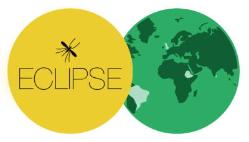Co-producing healthy futures
ECLIPSE
Empowering people with Cutaneous Leishmaniasis: Intervention Programme to improve patient journey and reduce Stigma via Community Education.
 ECLIPSE is a four-year, cross-cultural, applied health programme funded by the UK’s National Institute for Health Research (NIHR). The aims of the programme are to improve the physical and mental health outcomes of people with cutaneous leishmaniasis and to empower affected communities in Brazil, Ethiopia and Sri Lanka. Cutaneous leishmaniasis (CL) is a skin condition caused by infection with a microscopic parasite (Leishmania) which results in the development of skin lesions which heal slowly and are difficult to treat.
ECLIPSE is a four-year, cross-cultural, applied health programme funded by the UK’s National Institute for Health Research (NIHR). The aims of the programme are to improve the physical and mental health outcomes of people with cutaneous leishmaniasis and to empower affected communities in Brazil, Ethiopia and Sri Lanka. Cutaneous leishmaniasis (CL) is a skin condition caused by infection with a microscopic parasite (Leishmania) which results in the development of skin lesions which heal slowly and are difficult to treat.
The ECLIPSE team are working towards a patient journey that is holistic, patient-centred and mapped on a biopsychosocial model of CL. Two interventions will be co-developed, implemented and evaluated in each ECLIPSE country, aimed at promoting early diagnosis and treatment seeking behaviour, decreasing social isolation and stigma, empowering CL-endemic communities and improving treatment pathways.
The ECLIPSE team is strongly committed to involving community members in all the ECLIPSE activities in partner countries. This means that each stage of our applied health programme is conducted with community members, in line with our ethos: ‘no research about us, without us’. We recognise, value and wish to amplify the community knowledge and understandings of health and illness, and the facilitators and challenges to seeking treatment for CL. This recognition places community engagement and involvement at the heart of ECLIPSE. The communities’ experiential knowledge, combined with other knowledge (such as biomedical and anthropological insights), will result in the co-creation of new knowledge which will underpin the ECLIPSE interventions.
- Keele Academic Lead: Professor Lisa Dikomitis and Dr Helen Price
- Methods used: Team and individual ethnography, semi-structured interviews, focus groups, quantitative research including awareness and stigma surveys, community engagement, creative workshops, development and evaluation of community-based interventions, evidence synthesis and systematic literature reviews.
- Lead partners: Professor Leny Trad and Dr Paulo Machado, Federal University of Bahia, Brazil; Professor Suneth Agampodi, Rajarata University of Sri Lanka; Professor Afework Mulugeta, Mekelle University, Ethiopia.


